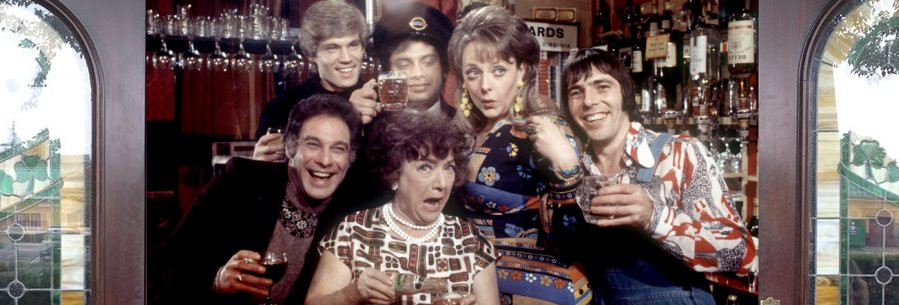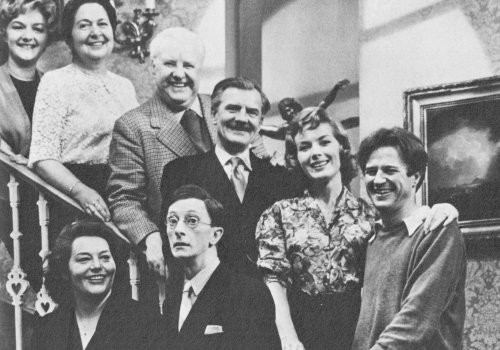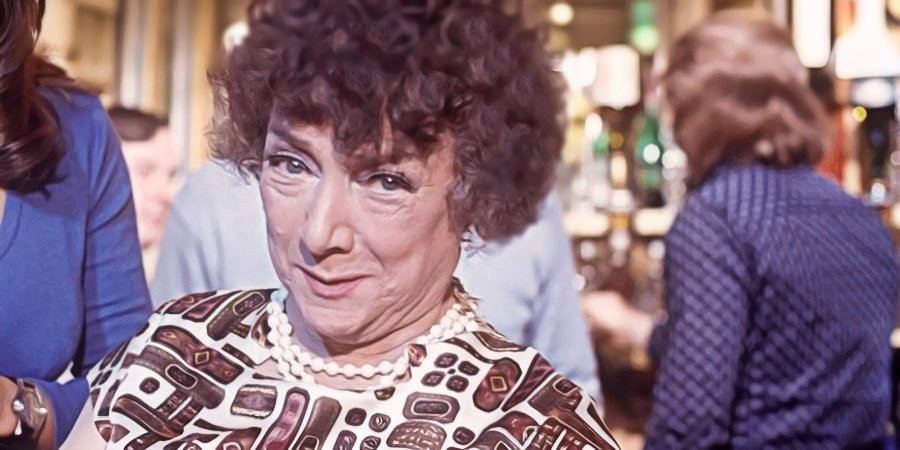
Hylda Baker
An iconic English comedienne whose modest success in the music-hall era forced her to give up show business several times, Hylda Baker, short in stature and with a rich Lancashire accent, became a star later in life as Nellie Pledge in the sitcom Nearest and Dearest where her humour, comic timing and hilarious malapropisms won over the hearts of the nation, leaving a legacy of joy and laughter. Behind the scenes things were decidedly different. Her personal life was full of disappointment, and she became difficult to work with, until finally, her career came to a shuddering halt.
Hilda Baker was born in her grandmother's house on 4 February 1905 (ever the romantic, she would later claim she was born ten days later - St Valentine's Day) in Farnworth, Lancashire. The first of seven children to Harold and Margaret, her father, although by profession a painter and signwriter, was also a well-known music hall comedian of his day who encouraged her to pursue the talents for performing that she displayed from an early age. Her first professional engagement was alongside her father at the Opera House, Tunbridge Wells, at the age of ten. But it wasn’t her first time performing. "I wasn't all that new to show business,” she would later recall. “At three years of age I was able to do six Lancashire steps (a form of folk dance with roots in the industrial North West of England) and a shuffle wearing Lancashire clogs."
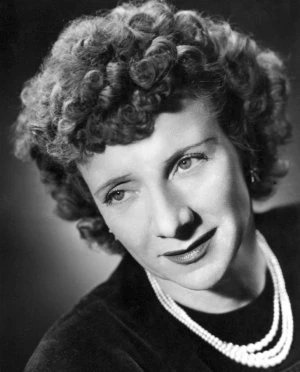
Billed as Little Hilda Baker, she toured the country appearing in music halls and small theatres as well as the Grand Theatre Bolton in July 1916, performing 2 shows nightly at 6.50pm and 9pm. The Bolton Evening News picked her out as, ‘on the edge of what ought to be a big career as a comedienne.’ By the time she reached St. Helens a week later the newspaper ads were boasting that she was, ‘The Greatest of all Juvenile Comediennes and Dancers’. Appearing at the Argyle Theatre Birkenhead in March 1917, the local paper reported that, 'Hilda Baker, a preciously clever child, won applause for her skilful dancing.’
At the age of fourteen, after experiencing four years of stage work, Baker decided she wanted to learn a trade. She went into a Bolton factory to learn tailoring, her wages dropping from £25 a week as a child prodigy to 25 shillings (£1.25p) as an apprentice in the ready-made clothes business. Six months of tailoring was enough for her and she returned to the stage. She left show business twice more after that - once to join an advertising agency and in the early/mid 1950s when, after a health breakdown, she took on a fish-and-chip shop belonging to her family in Farnworth. "I stuck that for six weeks," she told a Radio Times in 1957, "then when I felt better, I suddenly realised what I'd done and hurried back to show business before I lost my touch." The experience in the clothing factory stood her in good stead. With the noise of the machines surrounding her she found it impossible to be heard when speaking. The only way to converse with her work mates was to mouth the words without actually saying anything vocally. When she returned to the stage this became a part of her act and was developed into a comedy routine with her 'stooge,' Cynthia.
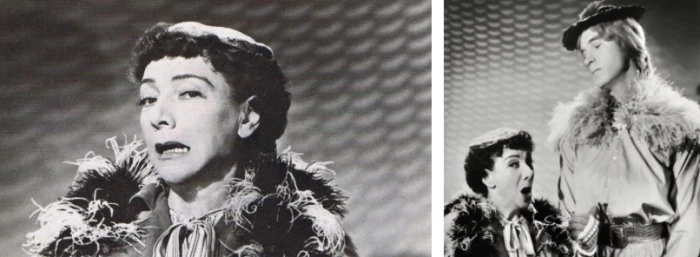
On returning to the stage, Baker started writing, producing and performing her own routines. Her stage act included a gossip from the North of England, with a silent, sullen companion - the gormless Cynthia, who was actually a tall man in drag. Standing next to the four-foot nine-inch Baker, who stood standing there in her size two shoes, the routine was a classic example of a double act with a twist. Baker, full of chatter and malapropisms, played against the silent Cynthia with the humour arising from the difference in size of the two performers and Baker's obliviousness to Cynthia’s unspoken reactions, created a hilarious contrast that left audiences in stitches. Her aside to the audience “She knows, you know,” even though it was abundantly clear that Cynthia really didn’t know anything, added to the hilarity.
Baker, who sometime between 1920 and 1921 changed the spelling of her first name substituting the ‘I’ for a ‘Y’, possibly to avoid confusion with another Hilda Baker, who was a well-known and established Westcountry contralto, continued to develop the act, adding catchphrases such as, "It's quarter past ...” before glancing at her wrist and announcing, “I must get a little hand put on this watch," and “Be sooooon!”, as she continued to perform around the country.
In 1929, Baker married Ben Pearson in Doncaster. The marriage did not last, and it was dissolved in 1933. Pearson passed away in 1965 aged 60 years. She never remarried.
Baker tragically suffered two ectopic pregnancies during the marriage, which may have been a key factor in the couple’s separation. Although she would consistently refuse to be drawn on the reasons for the divorce, she did divulge the following in a 1971 Daily Mirror interview: "In the years since I've had one or two love affairs. I'm really a very romantic person, easily hurt. I suppose I've never married again because the man I've been involved with has not been quite right somehow. I've always wanted children. My greatest dream was for eleven children. I'm not single because they've [men] let me down - it's always been me I suppose. I think it's very important to give and take in a relationship. My work is the most important thing in my life. It has to be - I've nothing else. Remember, I've got no one to go home to at night and if I'm unhappy in my work it upsets my whole life."
When war broke out in 1939, Baker continued to tour the country doing her bit to keep everyone's spirit up. Now billed as 'Hylda Baker - Britain's Greatest Revue Comedienne' she would play provincial theatres often headlining a cast of not-so-famous performers. In 1940 she led 'Meet The Girls (The Boys Have Left Behind) The First All Woman Show' which featured such luminaries as Del Strong, Violet Victoria & Daisie Dalton and Her Rhythm. The publicity promised a girls band of ‘30 Unattached Females.’ These reviews kept her gainfully employed but they didn’t make her a star. It would be more than a decade before she had her major breakthrough, and when it came, it was instant.
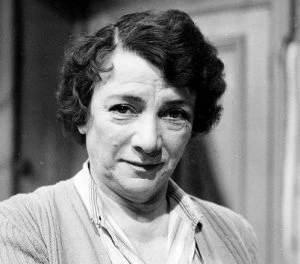
In 1955, Baker was appearing in Bearskins and Blushes, a saucy Windmill type show, when she was spotted by television producer Barney Colehan. He put her on the 11 March live broadcast of the BBC variety show The Good Old Days. On it, she did her usual stand-up routine and finished with a song. Also on that same bill was Ken Dodd, who was also making his television debut. Both stars made an impression, and in Hylda's case it was followed, the very next day, by an offer to top the bill in Blackpool. After more than thirty years as a fairly successful comic, she jumped into stardom with one television show. She became the talk of the North and her salary rocketed from £75 a week to £400 a week.
Before the year was out, Hylda Baker guested on the BBC afternoon radio show Worker's Playtime, and appeared on several other television variety shows which included Pick of the Pack and Holiday Hotel, the latter of which was hosted by Jimmy Jewel and Ben Warris. By 1957, she was offered her own series by the BBC, Be Soon, accompanied by ‘her friends and neighbours’, Glenn Melvyn, Jack Howarth (later Coronation Street’s Jack Walker), Pamela Manson, Michael Robbins (later still, Arthur in On the Buses), Tony Melody (a prolific character actor who went on to appear in Emmerdale Farm) and Cynthia (played by Guy Middleton). She was now earning approximately £13,000 a year (which would equate to around £250,000 in today's money).
Just as her career was snowballing – disaster struck. On Christmas Eve 1961, she was run over by a car that had veered onto the pavement on Charing Cross Road in London. The accident left her with a broken toe and bruising, causing her to claim that she was unable to work for 34 weeks and that it had given her "a waddle." She sued the driver for damages and loss of earnings, rejecting a settlement offer of £4,000. Taking the case to the High Court, she was initially awarded £2,921 but this amount was increased to £4,073 on appeal. It put her out of work temporarily, but she soon returned to the dizzy heights she had been reaching before the accident.
Baker landed some serious roles in shows like Emergency-Ward 10 and Z Cars, but her short, barrel-shaped appearance was always a gift for comedy writers and in 1963 she appeared in two series, Our House, the first conversion to television of the 'Carry On...' series of films and Best of Friends, a series of 13 half-hours. In 1967, she won a small part in Lionel Bart’s Oliver! in which she played Mrs Sowerberry, the wife of an undertaker played by Leonard Rossiter.
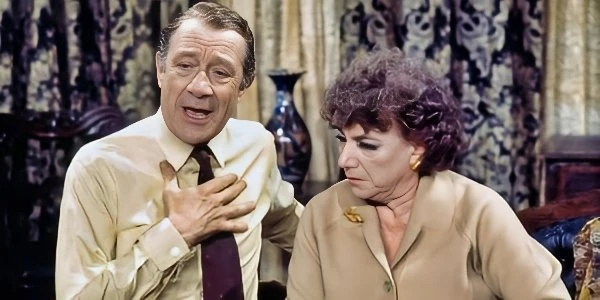
In 1968, Baker won the role that would guarantee her television immortality. In the Granada Television comedy series Nearest and Dearest, she starred as Nellie Pledge alongside Jimmy Jewel, who played her brother Eli. The show revolved around the love-hate relationship between their characters as they attempted to manage their small family business, Pledge's Pickles. While they exchanged barbs like "knock-kneed knackered old nosebag" and "big girl's blouse" onscreen, true life began to reflect fiction – only without any semblance of love.
When Jewel and Baker met for their first read-through, they remembered that they had (briefly) worked together, and as two Northern comedians they held each other in mutual respect. But as filming began, that respect completely collapsed. Initially, Baker was put out that Jewel was on camera more than she was, and as she considered herself to be the star of the show, she halted filming to complain. Her comment, 'just a minute, I'm in and out of this scene like a fart in a colander!' did little to endear her to her co-star. From that moment on each actor battled for dominance. Baker would insist on rewrites to give her a more prominent role or get the bigger laughs. She even encouraged the writers to drop some of her stage routines into the scripts such as her ‘little hand’ joke and her malapropisms such as referring to one character as “the Boston Dangler”, or being shocked by debauchery which she claimed was like “Soddom and Tomorrah” that almost left her having a “coronary trombonist.”
Baker and Jewel’s relationship went from bad to worse but as the series was a huge ratings hit there was no way out for either star. It was exacerbated further when the decision was made to produce a stage version of the sitcom for a summer season in Blackpool. Throwing the two stars together in the famous seaside town could only have been the invention of a complete lunatic. Booked to begin shortly after the fourth series had aired in 1970, the Nearest and Dearest stage show commenced with a try-out week in Bristol before transferring to Blackpool to start the season proper. When one of the series writers, Vince Powell, went to see how things were progressing, he found Baker outside the theatre checking, with measuring tape in hand, that Jewel’s name wasn’t higher than hers on the fascia boards. When Jewel was taken ill and had to miss a couple of shows, actor Ken Platt played the role of Eli. In 1971, Baker admitted that she'd suggested that Platt replace Jimmy Jewel in the television series. "I am the star," she said. "I was asked if I would accept him (Jewel) as Eli two-and-a-half years ago."
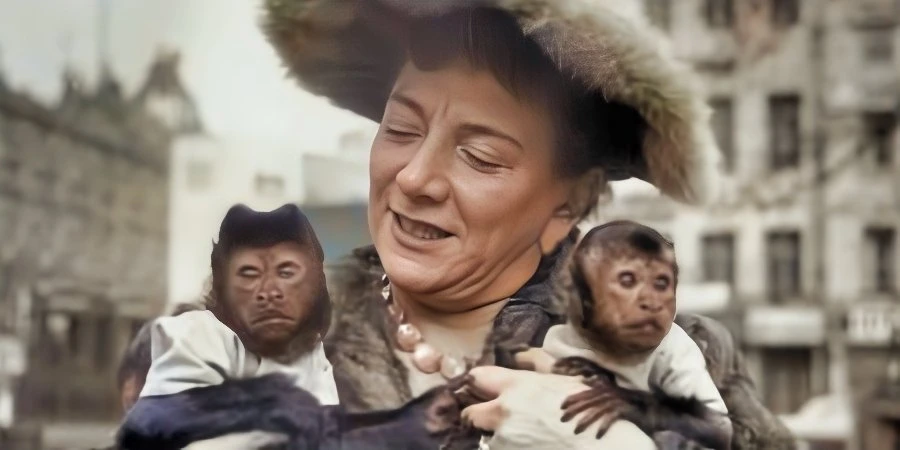
By this time Baker was living graciously in Cleveleys with a household of pets which included two Brazilian capuchin monkeys; Mickey and Coco, who she dressed in matching jackets and took with her wherever she went, despite the fact that they caused havoc whenever unattended. She dressed extravagantly adorned in expensive furs and annoyed her neighbours with noisy weekend parties at home.
In 1971, she had another setback when her chauffeur, Noel Moncaster, fled with £2,500 of her funds. Captured three months afterward, Moncaster had only £45 left, having spent the rest on trips to France, Spain, and Africa. During his court hearing, the Blackpool Magistrates’ Court mandated Moncaster to reimburse Baker £400—the highest amount they could decree—and deferred further sentencing to the upcoming quarter session.
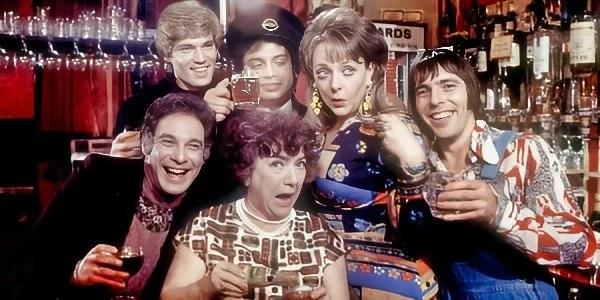
A film version of Nearest and Dearest was made by Hammer Films in 1972, but to the relief of both Baker and Jewel the 1973 series was the last. Baker had by now begun having trouble remembering her lines and had to rely on cue cards and prompts from her co-star Madge Hindle, who would whisper the next line to her. She went on to play a virtually identical role in the LWT comedy series Not On Your Nellie. In this series she played Nellie Pickersgill, who moves to London from the North to run her ailing father's pub. It was around this time that her health problems became more noticeable. Again she had difficulty in remembering her lines but now she was also refusing to attend rehearsals. After suing the production company for an on-set injury in which she broke her leg, the series ended, as did her television acting career.
In 1978, she joined forces with the Cockney actor Arthur Mullard to create a spoof of the Grease hit song 'You're The One That I Want.' Incredibly, the song, ("if you're chilled with infection, you're too sly to convey,") turned into a novelty success, climbing to number 22 on the UK singles chart, and resulted in a notably awkward performance by the duo on Top of the Pops. But this was very much Hylda Baker’s swansong.
Shortly after, she tried to fulfil a two-night booking at a Manchester night club with ‘Cynthia’ but she totally forgot the lines to the act she’d been performing for years. She was paid off by the management after one performance. Emotional, exhausted, and dazed with the indignity, she slipped and fell on the stairs outside her dressing room, grazing her face and cutting her knees. Unable to continue working and with no family to look after her, Hylda Baker moved into Brinsworth House, a home for retired variety performers in Twickenham; then in 1984, as her condition further deteriorated, intensified by Alzheimerr's, she moved to the Horton Psychiatric Hospital where she died of bronchial pneumonia on 1 May 1986.
Hylda Baker captivated audiences with her comedic brilliance and distinctive yet somewhat eccentric persona. Her tenacity and perfectionism often led to conflict as it propelled her to success in a male-dominated industry. Despite challenges, she became a celebrated figure in British entertainment, remembered for her unique talent and indomitable spirit.
(updated 26/06/2024 to correct some minor errors)
Published on June 12th, 2024. Written by Laurence Marcus for Television Heaven.




